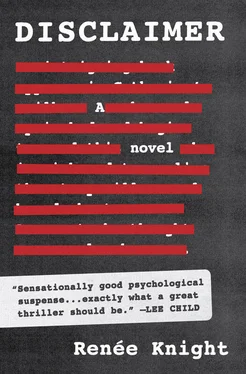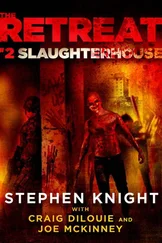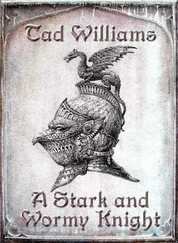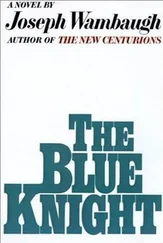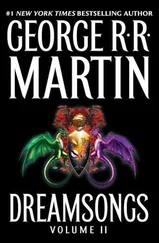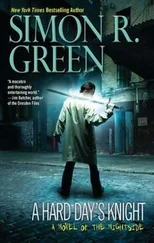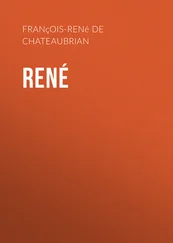Renée Knight - Disclaimer
Здесь есть возможность читать онлайн «Renée Knight - Disclaimer» весь текст электронной книги совершенно бесплатно (целиком полную версию без сокращений). В некоторых случаях можно слушать аудио, скачать через торрент в формате fb2 и присутствует краткое содержание. Год выпуска: 2015, Издательство: Harper, Жанр: Современная проза, на английском языке. Описание произведения, (предисловие) а так же отзывы посетителей доступны на портале библиотеки ЛибКат.
- Название:Disclaimer
- Автор:
- Издательство:Harper
- Жанр:
- Год:2015
- ISBN:нет данных
- Рейтинг книги:3 / 5. Голосов: 1
-
Избранное:Добавить в избранное
- Отзывы:
-
Ваша оценка:
- 60
- 1
- 2
- 3
- 4
- 5
Disclaimer: краткое содержание, описание и аннотация
Предлагаем к чтению аннотацию, описание, краткое содержание или предисловие (зависит от того, что написал сам автор книги «Disclaimer»). Если вы не нашли необходимую информацию о книге — напишите в комментариях, мы постараемся отыскать её.
recreates in vivid, unmistakable detail the terrible day Catherine became hostage to a dark secret, a secret that only one other person knew-and that person is dead.
Now that the past is catching up with her, Catherine’s world is falling apart. Her only hope is to confront what really happened on that awful day even if the shocking truth might destroy her.
Disclaimer — читать онлайн бесплатно полную книгу (весь текст) целиком
Ниже представлен текст книги, разбитый по страницам. Система сохранения места последней прочитанной страницы, позволяет с удобством читать онлайн бесплатно книгу «Disclaimer», без необходимости каждый раз заново искать на чём Вы остановились. Поставьте закладку, и сможете в любой момент перейти на страницу, на которой закончили чтение.
Интервал:
Закладка:
I know that I have never felt as proud of Jonathan as I should have. It shames me to recognise that I never quite believed in his courage. Was it bravery or recklessness? I try but fail to recall a single time, in the nineteen years he was with us, when he did not put himself before another human being. Not once. So why then? And why couldn’t he swim back? Was the sea really too strong?
“Why did the Spaniard make it back and not Jonathan?” I had once burst out to Nancy and she gave me the answer I wanted to hear.
“He was too far out by then. He was exhausted. He had done the hard work. The Spaniard only had the last leg.”
When I get home, I start to shiver again. The temperature in the house is colder than outside. I sit down at my desk and open the drawer where I keep the photographs. I look through them again. Pictures of a mother and son on a beach; in a café, her coaxing a spoon into his mouth; eating ice cream together. They look so natural. She smiles, he smiles. They are on holiday. In one photograph she is looking straight into the camera. You could believe the photographer was sitting with them at the same table, but I don’t believe that anymore. She didn’t know she was being photographed, just like Nancy didn’t know when Jonathan captured her sitting in the garden in the deck chair. He was good. He had a talent for photography. They are the sort of photographs you would see in a celebrity magazine taken by a member of the paparazzi. Up close and personal, but from a safe distance. An illusion of intimacy. We had bought our son the most expensive zoom lens we could afford.
The photographs in the hotel room are different. There is nothing natural about them. They are posed, I see that now. And as I look at them, horror is added to my shock. I see something I had chosen to miss before. It is fear.
If it had been me and not Nancy who had developed the film from Jonathan’s camera, and if I had sat alone looking at those photographs as she did so soon after his death, would I have seen what she saw? Or would I have remembered the collection of porn I found in Jonathan’s bedroom? Or perhaps I would have had the film developed first and found the porn later? Then would I have made a connection? I threw the magazines away so Nancy could remain innocent of her boy’s appetites. But I made myself an innocent too. I dismissed them at the time, and then failed to recall them when I came across the photographs all those years later. I saw what I wanted to see. But I wonder about Nancy. I wonder whether perhaps she did see something else. And I wonder whether that is what compelled her to write the book. She wrote it for herself, no one else.
Did she construct that story so she could lay her son to rest in peace? Not my son though. My son is in an altogether less restful place. I say a prayer for Nicholas Ravenscroft’s recovery and think how Nancy would laugh at me but I cannot conjure her up and I realise I am grateful for the silence. I return the photographs to their envelope.
I asked Catherine Ravenscroft, why hadn’t she told Nancy when they met? Why didn’t she tell her she had been raped? She looked at me in surprise.
“I haven’t told anyone,” she said. “And I didn’t want to cause her any more pain.” I was the first person she had told. And she told me because she had been forced to. She had been forced again, against her will. I think she actually meant it when she said she was sorry. She pitied me, but I don’t want her pity. I want her to hate me. I need someone to hate me more than I hate myself. I need to tell her what I did to her son. That I am the reason he is where he is now.
I dial her number. I have dialled it before, but never spoken. She picks up.
“Hello?” She must be driving — her voice sounds small against the hum of traffic in the background.
“I showed your son the photographs of you.” I wait for a response but none comes, so I go on. “My wife wanted you to suffer as she had,” I say and tell her about my contact with Nicholas. “I led him to believe you were in love with Jonathan, that Jonathan’s life was worth more to you than his.” I hear her breathing above the sound of the road, short little gasps, but she says nothing. I expect her to hang up, but she doesn’t.
“You should tell your husband,” I say as gently as I can.
“You fucking tell him,” she whispers, and her words give me hope that at last she has found it in her heart to hate me.
53. END OF SUMMER 2013
It is Robert who is at Nicholas’s bedside when he opens his eyes, and it is Robert who tells Catherine the news. He sends her a text and she receives it during her second session with the therapist she had agreed to see through work. She had almost not gone, but she had a feeble hope that maybe it would help her. The therapist frowns when the text comes in. Her phone should have been turned off. Catherine stands up and says she has to leave. The young woman cocks her head and says nothing. The therapeutic experience feels to Catherine as if she is having her teeth individually pulled out with great earnestness and super care, and that the new dentures she will eventually be fitted with will make her feel a whole lot better. In the meantime though, it is important for her to get used to the gaping, bloody holes in her mouth.
“It’s my son. He’s just opened his eyes.”
The head cocks the other way.
“He’s in intensive care.”
A look first of surprise, then of enlightenment, as if the therapist suddenly understands what this is all about. She doesn’t, but it’s not her fault. Catherine hasn’t told her. She hadn’t asked. She hadn’t asked any of the right questions and Catherine had only responded directly to questions, not volunteering anything herself. She is an uncooperative patient, a patient who seems unwilling or unable to help herself.
When Catherine arrives at the hospital, a nurse tells her Robert left five minutes ago. He is careful to time his arrivals and departures so he doesn’t have to see her, but she is not sure she cares anymore. She sinks to her knees, leaning into Nicholas, telling him that she is there; telling him everything is going to be all right; telling him he is safe now: telling him she loves him more than anybody else — more than she has ever loved anybody. Nicholas has opened his eyes but he doesn’t focus on anything. He stares at nothing, unresponsive, but the doctor is hopeful. Patience. It will take time. They will carry out more tests, but so far the signs are good. He is likely to make a slow but possibly full recovery. It is good news. If the good news had not come, Catherine had decided she would kill herself. She’d thought about how she might do it. Throwing herself under a tube train was not an option: pills and alcohol were her preferred choice of death.
Robert still doesn’t know she was raped. She is waiting for the moment when he will be told. She hopes it will come soon. Surely Stephen Brigstocke will find the courage to do this one thing for her? If he doesn’t then she will have to tell Robert herself and she feels sick at the thought that he might not believe her. She shouldn’t have to persuade him, she shouldn’t have to convince him that she is telling the truth, but she fears that that is exactly what she would have to do. His contempt for her is so solid that now he is more likely to believe Stephen Brigstocke than her but still, it will be cruel to leave him in ignorance much longer. She is punishing him by delaying the revelation, but it was Robert who was so quick to allow a wall to come between them, Robert who slammed the door shut on her.
She will not hesitate to tell Nicholas. Now she knows they are both going to live, he must hear it from her and no one else. However painful it is for both of them, he must know. But he is not strong enough yet; it will be a little while before he is ready. She strokes his hand. His fingernails are too long. She will bring in some clippers and tidy them up. She has a sudden memory of the tiny clippers she’d used on his nails when he was little. How soft his nails were. In the end she’d used her teeth to gently nibble them down so he wouldn’t scratch himself in the night. She checks the time; Robert should have been here by now but she is glad that he is not. She catches the eye of a nurse. She saw Catherine look at her watch; she disapproves. They all disapprove of Catherine. They prefer Robert. The poor husband. The devoted father. She is an hysterical, unstable mother. The woman who attacked that frail old man. Once she would have cared what they thought, but not anymore. She lays her head on the bed and closes her eyes, grateful for this extra time alone with her son.
Читать дальшеИнтервал:
Закладка:
Похожие книги на «Disclaimer»
Представляем Вашему вниманию похожие книги на «Disclaimer» списком для выбора. Мы отобрали схожую по названию и смыслу литературу в надежде предоставить читателям больше вариантов отыскать новые, интересные, ещё непрочитанные произведения.
Обсуждение, отзывы о книге «Disclaimer» и просто собственные мнения читателей. Оставьте ваши комментарии, напишите, что Вы думаете о произведении, его смысле или главных героях. Укажите что конкретно понравилось, а что нет, и почему Вы так считаете.
